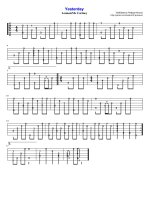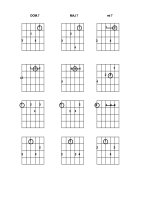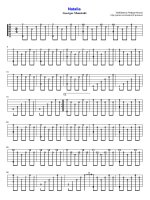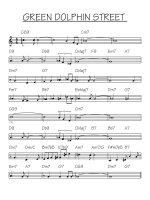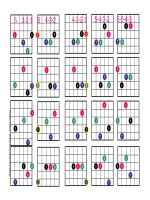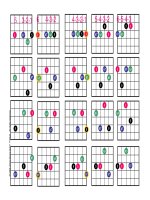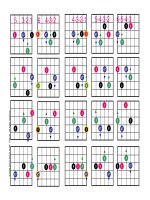BA page design newsletters newspapers tủ tài liệu bách khoa
Bạn đang xem bản rút gọn của tài liệu. Xem và tải ngay bản đầy đủ của tài liệu tại đây (6.8 MB, 15 trang )
Newsletters & Newspapers
Newsletters &
Newspapers
Beautiful and simple, too, win accolades with this one-column gem.
How to design a news letter
Once upon a time, newsletter meant an actual
letter, with news. That was before desktop publishing got us making them into little newspapers, with columns and boxes and all that. Why
wrestle with such complications? This sleek,
letter-style design communicates better—and
is much easier to make. Print it on nice paper,
and you’ll win raves—and get your evenings
back. Here’s how.
1
Set up the grid
Although the text is set in one wide column, a
sophisticated, six-column grid underlies the
page. It is used to guide your placement of
headlines, photos, captions and quotes, ensuring a neat, consistent layout.
2
Newsletters and Newspapers
Type Note This design uses Times for text and
Futura—a very bold sans serif—for heads, captions
and quotes. It is a handsome combination, but
many others will do. When choosing, look for lots of
contrast; the small heads need to stand out.
TIMES
FUTURA EX BOLD
Page specs
Here are the measurements used (in picas): a lettersize page, left margin of 13p; right margin, 9p; top
margin 4p; and bottom margin, 4p. There are six
columns, with one pica between each. Using your
ruler guides, drag your horizontal guides to 4, 11.5,
19, 59 and 62 picas. Drag vertical guides to 2, 9 and
44 picas.
What makes it work?
Recessed headlines and
bylines. One size, one width,
no clutter.
Photos, quotes and text
snap to vertical grid for
handsome, consistent pages.
Asymmetrical page leaves
room for stuff—a logo, list
of corporate officers, newsletter staff, publication date,
photos, quotes, anything.
Spacious, 18-point text leading yields high legibility, adds
an elegant air. Keeps production peppy, too—it snaps
right to the standard ruler.
How to design a news letter
3
Set up style sheets
2
Edit style
Type
Paragraph
Spacing Hyph
Name
Based on Next
Font
Size Lead Color Case
Body
No style
Same
Times
10.5
18
Black
Normal
0
1
0
Just
On
Body
Times
10.5
18
Black
Normal
0
0
0
Just
On
Body First Body
Byline
No style
Same
FutBd
Headline
No style
Byline
FutXBd
Left First Right Align After Letter
6
7
Black
All caps
0
0
1
Left
10
12
Black
All caps
0
0
1
Left* 0p4
40
Off
0
Off
Quote
No style
Same
FutXBd
7
8
White
All caps
1
1
0
Ctr
Caption
Quote
Same
FutXBd
7
8
Black
Normal
1
1
0
Ctr
On
On
Address
No style
Same
FutBd
6
15
Black
Normal
0
0
0
Left
On
Date
Address
Same
FutBd
5.5
7
Black
Normal
0
0
0
Left
On
*Add rule below paragraph: Weight: 1pt., Offset: 0p6, Length: text. Remove rule when setting remaining styles.
3
Build the nameplate
The nameplate relies on a bold, condensed
typestyle for its visual muscle; the font used
here is Onyx. Note that the condensed characters, normally used to save space, have here
been spread apart. This visual counterpoint
gives the nameplate its unique style. To do this,
force-justify the name to the ends of the bars
125-point Onyx forcejustified to bar width
20K bar
60K bar
Set the name in two text
blocks: force justify; drag
into position.
9 points
161 points
The finished result.
4
Newsletters and Newspapers
beneath. To look as if you’ve worked harder, set
the first letter bigger, in a separate text block,
and stretch the others to meet it. Then align the
tops as shown; note where the finished word
rests on the gray bars. The white subtitle is also
force justified within the gray bar.
The back page
Flow the text from the top margin (to align it
with the front-page nameplate). When adding
photos and quotes, make use of the six-column
grid for precise alignment.
Amet, consectetur adipscing elit, diam nonnumy eiusmod tempor
incidunt ut labore et dolore magna aliquam erat volupat. Ut enim
ad minimim veniami quis nostrud exercitation ullamcorper suscipit laboris nisl ut aliquip ex ea commodo dolore magna consequat.
Place the photo and its caption
in the wide outside margin. The
white space frames the photo
and calls attention to it.
Duis autem vel eum irure dolor in reprehenderit volu.
Molestaie son consequat, vel illum dolore eu fugiat nulla pariatur. At vero eos et accusam et justo odio dignissim qui blandit
praesent lupatum delenit aigue duos dolor et molestais exceptur
sint occaecat cupidat non provident, simil tempor sunt in culpa qui
officia deserunt mollit anim id est laborum et dolor
fugai. ea commodo consequat. Duis autem vel eum
irure dolor in reprehenderit in voluptate velit esse
molestaie son consequat, vel illum dolore eu fugiat
nulla pariatur. At vero eos et.
Accusam et justo odio dignissim qui blandit praesent lupatum delenit aigue duos dolor et molestais
exceptur sint occaecat cupidat non provident, tempor sunt in culpa qui officia deserunt mollit anim id
est laborum et dolor fugai. Consequat, vel illum dolore eu fugiat nulla pariatur.
At vero eos et accusam et justo odio dignissim qui blandit praesent lupatum
delenit aigue duos dolor et molestais exceptur sint occaecat cupidat non provi-
Stretch the text block to the
left and right edges of the
quote box, 1 pica from the top,
and center the type. Indent the
text 1 pica left and right.
dent, simil tempor sunt in culpa qui officia deserunt mollit anim id est laborum
et dolor fugai. Ea commodo consequat. Duis eum henderit in voluptate velit esse
molestaie son consequat, vel illum dolore eu fugiat nulla.
Amet, consectetur adipscing elit, diam nonnumy
eiusmod tempor incidunt ut labore et dolore magna
To place the caption text block,
drag a guide 1 pica to the left of
the text. Set the baseline of the
caption to be 15 points from
the bottom of the photo.
aliquam erat volupat. Ut enim ad minimim veniami
quis nostrud exercitation ullamcorper suscipit laboris nisl ut aliquip ex ea
commodo consequat. Duis autem vel eum irure dolor in reprehenderit in
voluptate velit esse molestaie son consequat, vel illum dolore eu
fugiat nulla pariatur. At vero eos et accusam et justo odio dignissim
qui blandit praesent lupatum delenit aigue duos dolor et molestais
exceptur sint occaecat cupidat non provident, simil tempor sunt in
culpa qui officia deserunt mollit anim id est laborum et dolor fugai.
ea commodo consequat. Duis autem vel eum irure dolor in reprehenderit in voluptate velit esse molestaie son
Amet, consectetur adipscing elit, diam nonnumy eiusmod tempor
Amet, consectetur adipscing elit, diam nonnumy eiusmod tempor incidunt ut
incidunt ut labore et dolore magna aliquam erat volupat. Ut enim
labore et dolore magna aliquam erat volupat. Ut enim ad minimim veniami quis
ad minimim veniami quis nostrud exercitation ullamcorper suscip-
nostrud exercitation ullamcorper suscipit laboris nisl ut aliquip ex ea commodo
it laboris nisl ut aliquip ex ea commodo dolore magna consequat.
dolore magna consequat. Duis autem vel eum irure dolor in volu.
Duis autem vel eum irure dolor in reprehenderit volu.
Molestaie son consequat, vel illum dolore eu fugiat nulla pariatur. At vero eos et accusam et justo odio dignissim qui blandit
Molestaie son consequat, vel illum dolore eu fugiat
nulla pariatur. At vero eos et accusam et justo odio
praesent lupatum delenit aigue duos dolor et molestais exceptur
dignissim qui blandit praesent lupatum delenit aigue
sint occaecat cupidat non provident, simil tempor sunt in culpa qui
duos dolor et molestais exceptur sint occaecat cupidat non provident, simil
officia deserunt mollit anim id est laborum et dolor
est laborum et dolor fugai. Consequat, vel illum dolore eu fugiat nulla pariatur.
fugai. ea commodo consequat. Duis autem vel eum
At vero eos et accusam et justo odio dignissim qui blandit praesent lupatum
irure dolor in reprehenderit in voluptate velit esse
delenit aigue duos dolor et molestais exceptur sint occaecat cupidat non provi-
molestaie son consequat, vel illum dolore eu fugiat
dent, simil tempor sunt in culpa qui officia deserunt mollit anim id est laborum
nulla pariatur. At vero eos et.
et dolor fugai. Ea commodo consequat. Duis eum henderit in voluptate velit esse
Accusam et justo odio dignissim qui blandit praesent lupatum delenit aigue duos dolor et molestais
exceptur sint occaecat cupidat non provident, tempor sunt in culpa qui officia deserunt mollit anim id
est laborum et dolor fugai. Consequat, vel illum dolore eu fugiat nulla pariatur.
At vero eos et accusam et justo odio dignissim qui blandit praesent lupatum
et praesent lupatum delenit reprehenderit.
Os dolor et molestais exceptur sint occaecat cupidat non provident, simil
est laborum et dolor fugai. Consequat, vel illum dolore eu fugiat nulla pariatur.
At vero eos et accusam et justo odio dignissim qui blandit praesent lupatum
delenit aigue duos dolor et molestais exceptur sint occaecat cupidat non provident, simil tempor sunt in culpa qui officia deserunt mollit anim id est laborum
delenit aigue duos dolor et molestais exceptur sint occaecat cupidat non provi-
et dolor fugai. Ea commodo consequat. Duis eum henderit in voluptate velit esse
dent, simil tempor sunt in culpa qui officia deserunt mollit anim id est laborum
delenit aigue duos dolor et molestais exceptur sint occaecat cupidat non provi-
et dolor fugai. Ea commodo consequat. Duis eum henderit in voluptate velit esse
lupatum delenit aigue duos dolor et molestais exceptur sint occaecat cupidat non
molestaie son consequat, vel illum dolore eu fugiat nulla.
provident, simil tempor sunt in culpa qui officia deserunt mollit anim id est
laborum et dolor fugai. Ea commodo consequat. Duis eum henderit in voluptate
Amet, consectetur adipscing elit, diam nonnumy
eiusmod tempor incidunt ut labore et dolore magna
To set up a spread, mirror the
existing grid; you want the blank
columns to the outside.
aliquam erat volupat. Ut enim ad minimim veniami
quis nostrud exercitation ullamcorper suscipit laboris nisl ut aliquip ex ea
velit esse molestaie son consequat, vel
illum dolore eu fugiat nulla.
Amet, consectetur adipscing elit,
diam nonnumy eiusmod tempor inci-
commodo consequat. Duis autem vel eum irure dolor in reprehenderit in
dunt ut labore et dolore magna aliquam erat volupat. Ut enim ad minimim
voluptate velit esse molestaie son consequat, vel illum dolore eu
veniami quis nostrud exercitation ullamcorper suscipit laboris nisl
fugiat nulla pariatur. At vero eos et accusam et justo odio dignissim
ut aliquip ex ea commodo consequat. Duis autem vel eum irure
qui blandit praesent lupatum delenit aigue duos dolor et molestais
dolor in reprehenderit in voluptate velit esse molestaie son conse-
exceptur sint occaecat cupidat non provident, simil tempor sunt in
quat, vel illum dolore eu fugiat nulla pariatur. At vero eos et
culpa qui officia deserunt mollit anim id est laborum et dolor fugai.
accusam et justo odio dignissim qui blandit praesent lupatum
ea commodo consequat. Duis autem vel eum irure dolor in repre-
delenit aigue duos dolor et molestais exceptur sint occaecat cupi-
henderit in voluptate velit esse molestaie son
dat non provident, simil tempor sunt in culpa qui officia.
To add a photograph above the headline
Place the photo across the two columns. Apply
text wrap: Left, 1p0; Right, 1p0; Top, 0p3;
Bottom, 4p6. Adjust the headline/byline spacing as shown. If it crowds the text, add space
between the byline and text by adjusting the
wrap tolerance.
Apply text
wrap
directly to
photo.
6 points
Maintain at
least 12 points
of breathing
room.
How to design a news letter
5
Newsletters &
Newspapers
A cross between paperback and magazine, this low-key, text-rich format is
ideally suited for long, thoughtful articles—and it’s easy to lay out.
This digest-size newsletter
is for readers
Three of the most popular five magazines
in America, Reader’s Digest, TV Guide, and
National Geographic, share an interesting
physical trait: All three are smaller than regular
magazines. Each is approximately digest size.
Paperback books are even more popular—
and their pages are smaller still.
Is there something special about a small
page? Sure! It’s eminently portable.
A small page confines the reader’s attention
naturally. Its design, therefore, can be as quiet
as a library. This makes it ideal for education or
business topics. The designer is free to work on
the words.
Upline calls itself a newsletter but is less news
than instructional and motivational articles,
the kind you’d find in seminars and schools. It’s
a perfect candidate for a digest: Its smooth,
beautifully set stories are just right for putting
up your feet for a good read.
Let’s take it apart to see how it was done.
6
Newsletters and Newspapers
Great for short runs and small
budgets, a digest can be published
right in your office. Print two pages
on each side of a letter-size sheet,
then stack, fold and staple the
results. Be aware that pages must
be laid out in a different sequence
than how you read them—in printer
spreads. For example, in a 12-pager, page 1 abuts
page 12, page 2 abuts page 11, and so on. The oddnumbered pages are always on the right. Lay out
your pages normally if your layout program offers
the option to build printer spreads or a booklet.
Otherwise, fold yourself a paper dummy, number
its pages, and figure the juxtaposition of pages
from that.
Upline and its contents are copyright of MLM Success, Inc.,
Charlottesville, VA.
Depth and variety in B&W
Look at what you can do in black and white!
Synopsis-style contents makes the most of
page 1, then tints of black add visual depth.
The background should be your middle value
(here 30 percent black), against which light and
dark tints will have the greatest effect. Small
type should have the highest contrast; note
here the headlines are boldface white while the
text is lightface black. Large type can be much
more subtle; note shading of the nameplate (50
and 10 percent black). If your final output will
be from a low-res printer, your background
should remain white (below left).
The scholarly look
As easy to read as a book, this format imparts to its subject a sense of scholarship and authority that is difficult
and often impossible to attain on showier pages. Set all
in one type family (two if you want), its handsome
typography provides visual variety without distractions.
The design has three key layouts: an article spread
for feature stories, a news spread for briefs, and the
table of contents, which this design carries on page 1.
As you work with it, you’ll find that small type and
pictures seem bigger than they do on normal pages, just
like fish look bigger in a small bowl. That’s a bonus of a
digest: You can comfortably stuff (and read) more per
inch than you otherwise could.
Page 1
Article spread
This digest-size newsletter is for readers
7
1
Set up the grid
Wide margins impart a big-page look
The one-column grid is designed to accommodate a variety of features, some aesthetic,
others for production efficiency. Its wide outer
margins impart an expansive, big-page look—
valuable in such a small space—and make
room to extend pictures and callouts, which
will provide visual relief from the gray columns.
The narrower columns are made from ruler
guides or text boxes, not column guides, so text
will flow freely across them. In the few cases
where the narrow columns are needed, just
drag your text into position. Two middle horizontal guides mark the locations from which
various texts will “hang.”
8
Newsletters and Newspapers
Page specs
The specs for this page are:
33 × 51 picas, facing pages. The
inside margin (in picas) is 3p;
outside, 7p; top, 5p; and bottom,
5p. Zero rulers at top center. On
the master pages or template,
place vertical ruler guides at 29.5,
15.25 and 13.75 picas, both sides
of center. Place the horizontal
ruler guides at 2, 7 and 47.5 picas. Note: The cover
has backward margins. Build it to fit a left-hand
page, then make it page 1.
2
Select your type
Typestyle sets the stage
Your choice of typestyle is the easiest place to
establish your digest’s visual character. For an
authentic book look, use just a single typeface
and its italic, with no bold at all (to also look
scholarly, select an older typeface, such as
Caslon). More flexible is a big type family,
which includes bold and extra bold characters;
typical is Century Condensed. Its contrasts give
you many tones of voice, which you’ll find
helpful if you have a lot of subheads and miscellaneous items. For more difference, add a
3
display face (Poplar is used here) for headlines,
drop caps and callouts. In every case, we recommend a light, serif typeface for text, to which
readers are most accustomed.
Lay out the pages
Start at the top
The template is designed on a highly convenient 12-point grid and demonstrated by a
single type family; the sizes given here are specific to this design. Your type sizes will have to
be adjusted for the face(s) you choose.
All stories start at the top of a page with a
kicker, headline, deckhead and a very large
Set first few words
in small caps
initial drop cap. Note that the gray kicker box
touches the edge; this will be truncated by a laser
printer, in which case the box can be traded for
an underline. Note, too, the first few words of
text are set in small caps; this is one of those
sophisticated details that requires individual
attention and can be skipped if time is tight.
Kicker
Font: Century Light Condensed, 11/11
Department name: All caps, white
Byline: U&lc, black. Type insets 4 pts from edges
of K50 bar
Headline
Font: Century Light Condensed 33/36, align left
Deckhead
Font: Century Light Condensed 15/18, align left
Text
Font: Century Light Condensed 10/12, justify
Align drop cap with
sixth text baseline
Drop cap
Font: Century Light Condensed 120/120, color K60
This digest-size newsletter is for readers
9
4
Add visual interest
How to break up the page without artwork
If text is placidly flowing water, drop caps and
large-type callouts are rocks in the riverbed—
they create eddies and swirls that give the page
a natural, visual appeal. Callouts go to the outside. Choose your text carefully: Callouts are
read first and create a frame of reference for the
entire spread. (A wise editor can put this to
good use.) And stick to one drop cap per page.
More than two on a spread, and your reader
will try to figure out what they spell.
2nd page plain
2nd page with breaks
Three ways to start a new topic…
Insert a line space…
One empty line is the shortest kind
of pause other than a paragraph
indent. The new line is not indented
(no need for both kinds at once).
This break can occur anywhere on
the page, but it’s most effective
near the middle.
10
Newsletters and Newspapers
OR use a bold phrase…
A phrase in bold will draw the eye
more sharply. After a line break,
simply set the first few words of
the next sentence in bold type. Be
sure to be consistent: Caps, if used
once, should be used every time.
AND try a drop cap
A drop cap creates by far the
biggest ripple in the text. Unlike the
lead cap, secondary caps like this
are five, not six lines deep. Note,
too, the gray color (60 percent
black). Size and color serve to tone
down the effect.
Callouts draw the reader in
Space: 1p6
A callout aligns with a center ruler guide and
extends into the outside margin. Note text flows
uniformly around; any extra space goes underneath the callout. Best locations (below) are
top, bottom and at 15 pica.
Minimum 1p6
space
Callout
Font: Century Light Condensed 16/18, align left
5
Make it fit
Filler stories are tiny vacations
All work and no play makes even bright readers
wish they were elsewhere. A smart editor will
relieve the weight of feature articles with a variety of short, preferably light, ones. The perfect
place for these is the leftover spaces at the end of
long articles. Fill with
reports, quotations, cartoons, whatever. It’s smart
to build a library of material of various lengths.
?
News filler
Gray background box extends from outer
ruler guide 1 pica past the inside margin. The
head is set 18/18 and is aligned left. Lead
paragraph is set in italics 10/12, justified and
the two-column text is one point size smaller,
8/12, and is justified.
Quotation filler
Capitalize and center the head, italicize the
body, 10/12, justified, and set the attribution
in small caps, tabbed right or aligned right.
Rule above quote is 2 points. To be ideal, the
space between the items would stay consistent, but it can be adjusted to fit.
This digest-size newsletter is for readers
11
6
Design the news
Two columns for flexibility
News pages are set in two columns divided by a
vertical rule, which differentiates them clearly
from feature articles. Type is designed in several
“levels” to accommodate different kinds of articles and tones of voice. This enables the editor
12
Newsletters and Newspapers
to tune each story to the exact volume and
pitch it warrants. It also avoids the visual choppiness often found on news pages. For variety,
news pages make full use of the template’s narrow outer margins.
Four head levels
1 Flags the section. Black box draws the eye to
very light type.
1
2
Century Light Condensed 48/48, align left
3
2 An umbrella covering separate but closely
related articles.
Century Light Condensed 24/24, align left
3 Minor heads related directly to umbrella.
Century Ultra Condensed 9/12, align left
4 For news stories that stand alone. One, two
or three lines deep.
4
Century Light Condensed, 15/15, align left
Subheads have an important voice
No opportunity for good communication is
more often overlooked than the simple subhead. While the job of a news headline is to
report impersonally, a subhead can speak quite
naturally. It can be used to expand a headline’s
meaning, as it does here, but it’s also the best
place to address your readers in your everyday voice.
Century Light
Condensed Italic 9/12,
align left. Indent 1p0.
Half-column photos
As with drop caps and callouts, think of photos
as rocks in a riverbed and always make sure
your type can flow around them; don’t create a
dam. Two types are illustrated here: rectangular
and silhouette. Rectangular photos should all
be the same width; a half-column is ideal.
Silhouettes can be bigger; they are more interesting and will be perceived as more important.
Near the silhouette is an excellent place for an
important caption, like an announcement,
because everyone will read it.
This digest-size newsletter is for readers
13
Adjust news heads for fit
Three goals here: You need the flexibility of
one-, two-, and three-line headlines, which
don’t all land on the grid; you want your text to
align horizontally across columns, and you
want the empty spaces to look even. This can
all be done by adjusting Spacing before.
News head: Century Light Condensed 15/15, align left,
set all Spacing after to 0p6
Text aligns
across columns
1-line head: Space
once after the last
paragraph, then add
0p3 Spacing before
to the head.
2-line head: Space
twice after the last
paragraph, then set
the head.
3-line head: Space
once after the last
paragraph, then add
0p9 Spacing before
to the head.
7
Back pages
Leave room for the mailing label
A digest is almost always stapled but rarely
folded and therefore mails flat. A half-page
space for the label is typical, but you can get
away with less. Check with the post office
before finalizing your design. Whatever you
choose, be consistent from issue to issue.
Note that a small nameplate is part of the
return address.
14
Newsletters and Newspapers
How to name your newsletter
Naming a newsletter can be tough: Titles can
sound corny, dull, trite or all three. And the best
design in the world can’t compensate for a
dumb name or a mediocre idea. Tricks and easy
turns-of-phrase usually have no regard what
really must be done: communication.
Here are several suggestions: One, in working
out a name, whether it is for a newsletter or a
product or a whole business, the best advice is
to do it alone. You are the only one who cares.
Usually, committees don’t come up with good
names. (If you are already on a committee,
assign the job to the person who has the
strongest feelings about it.) Similarly, don’t poll
office colleagues or friends; as much as they
may try, they can’t be objective.
Your feedback should, and can, come from
one source only, your potential readers. This is
the key. No matter how much you—or the
boss—like the name, if readers yawn, no design
can save it.
To name your newsletter, think outside-in.
That is, think like a reader. You will realize that
a reader responds only when his or her personal interests, opinions and preferences are
clearly addressed.
For example, if your name is George, you
may be personally flattered by The George
Report, but how does a reader see it? To get the
idea, visualize your name on someone else’s
product. Then, you can be more objective. The
Doe Report is less interesting, isn’t it?
Corny names are often the result of disrespect for the product or the reader. Label-type
names can be dull because they usually give
the reader no point of entry. For example,
Update is a common but closed name. To see
this, compare Informer, Spy, Tattler and Juice.
They may not be appropriate for your publication, but each is open-ended; that is, each
engages the reader—in these cases, by hinting
at inside information.
Open your thesaurus. Find words with meanings common to everyone. Look for picture
words: Gibraltar, for example, is much better
than solid or trustworthy. Olympus is richer
than powerful.
If your name or reputation is very well
known, you should use it in your publication
name.
Most important, persist. Your name is
extremely valuable, and it is worth every
minute it takes to find the right one.
This digest-size newsletter is for readers
15


